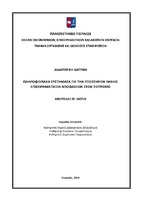Πληροφοριακά συστήματα για την υποστήριξη λήψης επιχειρηματικών αποφάσεων στον τουρισμό

Προβολή/
Λέξεις κλειδιά
Βαθμολογήσεις ; Ανάλυση αδόμητου περιεχομένου ; Ταξιδιωτικές κριτικές ; Τουριστική εμπειρία ; Unstructured content analysis ; Ratings ; Travel reviews ; Tourist experienceΠερίληψη
Η εξέλιξη της Τεχνολογίας Πληροφοριών και Επικοινωνιών και η αναβάθμιση του ρόλου των πελατών από απλούς δέκτες σε ενεργούς δημιουργούς ροών γνώσης απαιτεί από τον Τουριστικό Κλάδο, ως βιομηχανία εντάσεως πληροφορίας, την προσαρμογή στις ειδικές συνθήκες που συνεπάγεται ο ταχέως αυξανόμενος όγκος μεγάλων δεδομένων στο διαδίκτυο. Η κοινή παραδοχή ότι το μεγαλύτερο ποσοστό των δεδομένων αυτών είναι σε αδόμητη μορφή απαιτεί την υιοθέτηση νέων εργαλείων και μεθοδολογιών διαχείρισης και ανάλυσης αυτού του περιεχομένου σε μεγάλη κλίμακα. Οι καταγραφές των ταξιδιωτικών εμπειριών στις τουριστικές κοινότητες του διαδικτύου αποτελούν μια πολύτιμη, σε μεγάλο βαθμό αναξιοποίητη, πηγή πελατειακής γνώσης που παράγεται με αυθόρμητο και μη παρεμβατικό τρόπο. Η παρούσα διατριβή αντλεί με αυτοματοποιημένη μέθοδο ένα σύνολο πλέον των 17.000 ταξιδιωτικών κριτικών από την διαδικτυακή κοινότητα Tripadvisor που εκτός από τα κείμενα συμπεριλαμβάνουν δεδομένα βαθμολογήσεων καθώς και δημογραφικών και εμπειρικών χαρακτηριστικών των χρηστών. Οι κριτικές αφορούν τρία ιστορικά κέντρα μεγάλων πόλεων που αποτελούν διακριτά τμήματα των προορισμών με παρόμοια χαρακτηριστικά και συγκεκριμένα το Barri Gotic της Βαρκελώνης, την Πλάκα της Αθήνας και το Trastevere της Ρώμης. Ο σκοπός της παρούσας διδακτορικής διατριβής είναι η ανάπτυξη μιας μικτής μεθοδολογικής προσέγγισης για την ανάλυση του αδόμητου περιεχομένου των κριτικών με συνδυασμό αυτοματοποιημένων τεχνικών εξόρυξης και ανάλυσης κειμένου και ποιοτικής εννοιολογικής κατηγοριοποίησης για την αποτύπωση των σημαντικότερων στοιχείων της τουριστικής εμπειρίας στις τρεις προαναφερόμενες τοποθεσίες. Στο πλαίσιο αυτό διερευνώνται, μέσω διμεταβλητών αναλύσεων αλλά και ανάπτυξης δύο πολυμεταβλητών υποδειγμάτων λογιστικής παλινδρόμησης, οι κατηγορίες εννοιών των κειμένων που παρουσιάζουν την μεγαλύτερη συνάφεια με την μεταβλητή της βαθμολογίας των κριτικών, καθώς και η επιρροή των διαφορετικών χαρακτηριστικών χρήστη τόσο σχετικά με τις βαθμολογήσεις όσο και με τα στοιχεία της τουριστικής εμπειρίας. Τα αποτελέσματα περιλαμβάνουν την ανάδειξη των ομαδοποιήσεων εννοιών με συναισθηματικά στοιχεία υψηλής θετικότητας και έντασης καθώς και το ιστορικό βαθμολογήσεων χρήστη ως δύο παράγοντες που συνδέονται στενά με τις διακυμάνσεις της βαθμολογίας. Σε δεύτερο στάδιο, εξετάζεται κατά πόσο το συγκεκριμένο σχήμα ανάλυσης μπορεί να αναδείξει τα μοναδικά ανά προορισμό γνωρίσματα της τουριστικής εμπειρίας, με συγκριτική ανάλυση των τριών προορισμών μέσω διμεταβλητών αναλύσεων καθώς και χρήσης Σημασιολογικών Δικτύων Συνεμφάνισης. Η προσέγγιση επιτυγχάνει να αποτυπώσει με σημαντική λεπτομέρεια τις κυριότερες διαφορές και τις ομαδοποιήσεις των εννοιολογικών κατηγοριών τουριστικής εμπειρίας για κάθε προορισμό.


